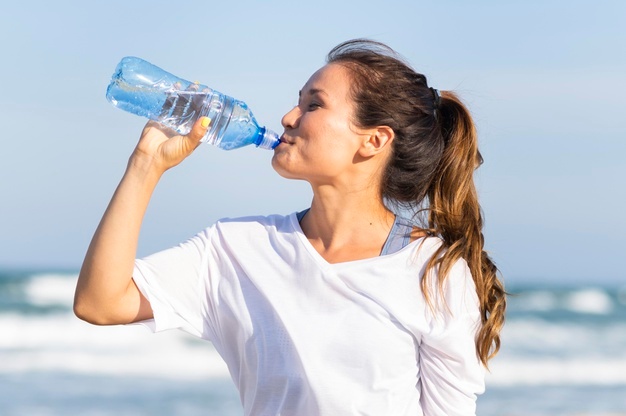
TYPES OF WATER AND ITS BENEFITS
- 29 Sep, 2021
- Posted by admin
- 0 Comment(s)
GAGANAMBU (RAIN WATER)
The rain water which has come in contact with Sunlight, Moon light and wind has these properties :
Jeevaneeya – Improves quality of life, is Enlivening.
Tarpana – satiating
Hrudya – It is Good for heart.
Cand soothing to the mind and Digestive system
Buddhi prabodhanam – Increases intellect
Tanu – Thin
Avyaktarasa – imperceptible taste
Sheeta – Cold in potency
Laghu – Light to digest
Amrutopamam – Compared to Amrut or nectar
If rain water is good or bad it depends on the season and place where it rains.
These properties described here are of rain water collected in a clean vessel directly, a little while after the rainfall. Also, it should be consumed within few hours of collection as it loses its properties if kept for longer hours.
But, nowadays, with this increasing industrialization and pollution, rain water has lost its qualities. So, it may not be good to consume.
TEST FOR RAIN WATER QUALITY
Rain water which makes the boiled rice kept in a clean silver utensil neither too moist nor changes its colour, is to be considered good for drinking.
SAMUDRA JALA (SEA WATER)
Seawater should be used for drinking only during Ashvayuja month. (During September,October or autumn season).
Reason for this is, during Ashvayuja month there will be the appearance of Agastya nakshatra (the star Canopus) which removes the poisonous properties of water, therefore, even water from other sources can be drank during this month.
Rain water which is collected in clean vessel and which has not changed its color, taste and odour, is suitable for drinking always.
In the absence of this water, the water from other sources of earth, which resembles rainwater in all qualities, which is collected from clean place with black or white soil, and which is exposed to sunlight and breeze.
RIVER WATER BENEFITS
Water of the rivers
- Which flow into the western ocean (Arabian sea)
- Which has sweet taste and pure water (uncontaminated) is good for health, where as the water of rivers flowing into eastern ocean is not ideal for consumption.
- The water of rivers arising from Himalaya and Malaya mountains, and which get well churned up by dashing or hitting against rocks are good for health, whereas if the same water gets stagnated or gets contaminated gives rise to worms (intestinal infections), filariasis, diseases of the heart, head, and throat.
- Water of rivers of the Prachya/gauda(central Bengal and parts of Orissa), Avanti /malwa round about the modern city of Ujjain ), (Aparanta/konkana(comprises of Goa north kanara districts of Karnataka),causes hemorrhoids.
- Water of rivers arising from Mahendra mountains northern part of the eastern gaths) causes enlargement of the abdomen and filariasis
- Rivers arising from Sahya and Vindhya mountains(mountain ranges of central India) causes leprosy (and other skin disease) anaemia and diseases of the head
- Rivers which arise from Pariyatra (western part of the Vindhya mountains)mitigate the (aggravated) dosas, bestow strength and sexual vigour, the water of the sea causes vitiation of all the three dosas.
The water of kupa (deep well), tadaga (artificial pond) etc should be considered similar in qualities and properties of the desert, marshy lands and mountains
During varsa ritu (rainy season) rain water is best and river water is least suitable for consumption.
CONTAMINATED WATER QUALITIES
Water which is
- Dirty, mixed with mud, weed, algae and leaves,
- Which is not exposed to sunlight and wind
- Which is a mixture of old and fresh water
- Which is thick, frothy not easily digestible, containing worms, hot (by nature)
- Causes tingling of teeth by being very cold
- Rain water which is un-seasonal
- Seasonal but that of the first rain (before the appearance of Agastya Nakshatra, is contaminated with the webs, saliva, urine, faeces of spider etc., and various other poisonous substances, should not be used for drinking
VARJAYA JALAPANA/AVOIDING WATER DRINKING
- Water which is dirty, mixed with mud, algae, weeds and leaves, which is not exposed to sunlight and wind.
- Which is a mixture of old and fresh, which is thick, not easily digestible, frothy, containing worms.
- Hot (by nature)
- Causes tingling sensation in teeth by being very cold
- Un seasonal rain water
- Seasonal but that of the first rain (before the appearance of Agastya Nakshatra, contaminated with the webs, saliva, urine, faeces of spider etc., and various other poisonous substances, should not be used for drinking.
EFFECTS OF WATER INTAKE WITH MEALS
- Drinking water in between meals – healthy habit
- Drinking water after meals – causes obesity (or good for weight gain)
- Drinking water before meals – causes emaciation (Good for weight loss)
PROPERTIES SHEETAL JALA (COLD WATER)
- Madatyaya – Alcoholic intoxication
- Glani – Exhaustion
- Murcha – Fainting
- Chardi – Vomiting
- Shrama – Debility (fatigue)
- Bhrama – Dizziness or giddiness
- Trushna – Thirst
- Ushna – Heat (of the sun) or burning sensation,
- Pittasra – bleeding conditions caused by aggravated pitta
- Pitta dominant conditions
- Visha – Useful in Poisoning
BENEFITS OF DRINKING HOT WATER
- Deepana – stimulates hunger, enhances digestive fire
- Pachana – helps with digestion, cures indigestion
- Kanthya – good for the throat
- Laghu – easily to digest
- Basti shodhana – cleanses the urinary bladder
- Relieves Hidhma – relives hiccup
- Adhmana – flatulence
- Anila – In aggravation of Vata
- Shleshma – In aggravation of Kapha
- It is ideal on the days of Panchakarma therapy
- Navajvara – fever of recent origin
- Kasa – cold, cough
- Ama – accumulation of undigested materials
- Peenasa – rhinitis (running nose)
- Shwasa – dyspnoea
- Parshvaruja – pain in the flanks.
Water which is boiled and then cooled is
- Anabhishyandi – Does not increases stickiness or moisture in the body
- Laghu – light to digest
- Useful in Pitta conditions.
Water which is kept overnight, is not ideal for consumption. It aggravates all three doshas.
NARIKELODAKA (COCONUT WATER)
Tender coconut water is
- Snigdha – unctuous
- oily Swadu – sweet
- Vrushya – aphrodisiac
- Hima – coolant
- Laghu – easy to digest
- Relieves Trushna – thirst
- Pittanila hara – balances Pitta and Vata.
- Deepana – enhances digestion
- Bastishodhana – cleanses urinary bladder
